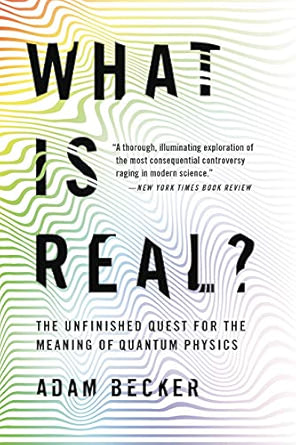More on this book
Community
Kindle Notes & Highlights
by
Adam Becker
Read between
October 13 - October 18, 2019
he characterized common sense as the collection of prejudices accumulated by the age of eighteen.
the myth that these physicists created a unified Copenhagen interpretation is just that—a myth.
Von Neumann’s solution was to make the observer—whoever was looking—responsible for wave function collapse. “We must always divide the world into two parts, the one being the observed system, the other the observer,” Von Neumann said. “Quantum mechanics describes the events which occur in the observed portion of the world, so long as they do not interact with the observing portion, with the aid of the [Schrödinger equation], but as soon as such an interaction occurs, i.e. a measurement, it requires the [collapse of the wave function].” It’s not entirely clear what von Neumann meant by this.
...more
according to Copenhagen, was not to be taken seriously as a theory of the entire world. It was, instead, a theory about how we interfaced with the world of the extremely tiny, a pragmatic invention, a means for predicting the outcomes of experiments and nothing more. And this was as it should be, according to Bohr: he claimed that the job of physicists was “not to disclose the real essence” of the world around us, but simply to find “methods for ordering and surveying human experience.”
If a measurement only happens when someone looks at a system, who, in particular, has to look? Everett argued that this line of reasoning leads inevitably to solipsism—the idea that you are the only being in the universe, and everyone else is somehow illusory or secondary, existing in states of indeterminate reality until you, the High Arbiter of Wave Function Collapse, deign to observe them.
But before that happened—in fact, before Bell had even thought of his theorem—another rebellion had started. This academic fight quickly grew into a revolution, toppling the previous order, with huge implications for the foundations of quantum physics. Nonetheless, it escaped the notice of John Bell and most other physicists. In fact, it hardly involved physicists at all. Yet the overthrow of logical positivism and the rise of scientific realism radically changed philosophy of science—and ultimately struck a major blow at the root of the Copenhagen interpretation itself.
The Vienna Circle thought the horrors of the political far right went along with the unscientific and outmoded philosophies that the circle was fighting against. The members saw themselves in the tradition of the great Enlightenment empiricist philosophers such as Hume and Locke, and promoted Enlightenment values: international cooperation over nationalism, reason over faith, humanism over fascism, and democracy over authoritarianism. They saw industrialization not as an oppressive force, but as a modernizing one.
look at the data,” Francis told him. “People will have lots of fancy theories, but always go back to the original data and see if you come to the same conclusions.…Common wisdom is frequently a poor interpretation of what is actually observed.”
Solipsism—the idea that you are the only person, and everyone and everything else is merely a hallucination of some kind in your own mind—was a problem that had haunted positivism from the start.
Physicists attacking many-worlds (or inflation, or string theory) usually have a more serious objection to the idea of a multiverse: they denounce it as a prime example of “unfalsifiability.” This unwieldy word, a ghost of philosophy past, comes from the work of Karl Popper. Popper was a celebrated mid-twentieth-century philosopher of science who spent most of his career at the London School of Economics. Popper had once held truck with the logical positivism of his native Vienna but ultimately took an iconoclastic stance of his own. Rather than championing a verification theory of meaning, as
...more
Claiming, then, that multiverse theories are unscientific because they are unfalsifiable is to reject them simply because they do not live up to an arbitrary standard that no scientific theory of any kind has ever met. Claiming that no data could ever force the rejection of a multiverse theory is merely stating that a multiverse theory is just like any other theory. And claiming that there could never be any observable evidence in favor of a multiverse theory is to forget Einstein’s admonition that “it is the theory which decides what we can observe.”
Atomic theory was once considered impossible to falsify, and atoms were once thought to be unobservable in principle. Evidence of a multiverse could share the same fate. Ultimately, arguments against a multiverse purportedly based on falsifiability are really arguments based on ignorance and taste: some physicists are unaware of the history and philosophy of their own field and find multiverse theories unpalatable. But that does not mean that multiverse theories are unscientific.
“This is a really bizarre story,” he said, summing up the history of his field. “You have, at the same time, the following two wildly contradictory things going on: the 20th century outstripped every other century… for the number of smart people who were interested in physics and working actively on physics. That same century witnessed the longest period of psychotic denial of this deep logical problem right at the center of this whole project!”
The full content of our theories—not only the mathematics but the claims about the nature of the world that come along with the mathematics—is important to the work of science.
So many people today—and even professional scientists—seem to me like somebody who has seen thousands of trees but has never seen a forest. A knowledge of the historic and philosophical background gives that kind of independence from prejudices of his generation from which most scientists are suffering. This independence created by philosophical insight is—in my opinion—the mark of distinction between a mere artisan or specialist and a real seeker after truth. —Albert Einstein


